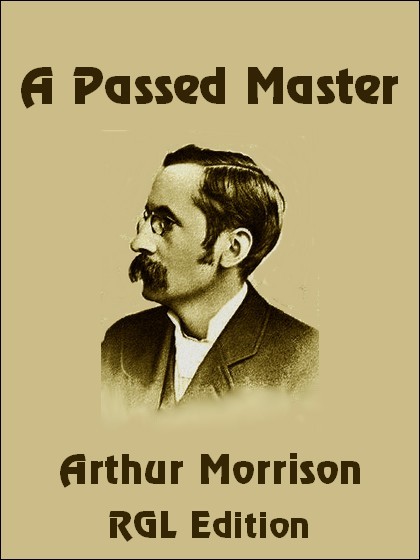
RGL e-Book Cover 2016©

RGL e-Book Cover 2016©
IT is not often that the performances of genius can be explained. Indeed, it is probably correct to say that no achievement of genius has ever really been explained yet--a circumstance which gives this simple record a unique interest. For here is embodied the complete explanation of certain achievements of genius which made the reputation of a young artist who is very conspicuous among the Post-prandial Symbolists--which, as you know, is famous as the very latest and most advanced of all the schools, and much venerated as the least comprehensible. As I am so freely giving away the secret of this young painter's success, it will be obvious that I cannot mention his true name--it would be treachery.
Stanley Ulbster was not always a successful painter; for long, indeed, he was as unsuccessful as any painter in London--a phrase more expressive of all utter failure than any other I can invent. A very enterprising--rashly enterprising--dealer had bought two of his pictures once, when first he came from Paris; but that was when the dealer--his name was Flack--was working on a sort of gambling "system." He bought a picture or two, "at a price," as he put it--meaning something not vastly differing from no price--from every young painter who was not utterly hopeless, on the chance of one here and there turning up trumps in the future.
Stanley Ulbster lodged in a small back room high in a house of a small back street in Bloomsbury--slept there, that is to say. But his studio was an excrescence on the roof of a tall house close by Charing Cross Road--a house which, by an extraordinary stroke of luck for the tenants, fell into a tangle of disputed succession soon after Ulbster began to owe his second quarter's rent. The result of this state of affairs was that so many people demanded the rent that nobody got it, and an application to the Court to appoint a receiver ad interim failed for some technical reason that nobody understood, but for which everybody was just as grateful, nevertheless. So it came about that for quite a long period of months Stanley Ulbster was enabled to provide himself with frequent dinners and luncheons, paid for out of money that would otherwise have been dissipated in rent.
It was not a studio to which the wealthy and the great might be expected to climb to sit for portraits. There was no lift, and, though Stanley Ulbster schemed a plan of fraudulently using the lift next door, and so reaching his eyrie by way of the roof, one could scarcely have expected a duchess to conspire in such an enterprise. The view of roofs was extensive and varied, and the dog, poultry, squirrel, and guinea-pig shops in St. Andrew's Street below contributed a smell which penetrated his very paintboxes, and a chorus of sounds which lent a pleasing tone of wild life to the general London roar.
But no earthly state of affairs remains long unchanged, and there were movements in the world of Art, and even some movements in the courts of law; so that the prospect of the settlement of the dispute among the competing landlords drew nearer, and with it the vision of a really authorized rent-collector, with a demand for ruinous arrears. Things as regards the studio were likely to grow serious. As for the movements in the world of Art, they were revolutionary, for Art is always being revolutionized. Post-mortem Depressionism, with its extending jaws and yearnest eyes, had given way to Bedpost Expressionism (or something with a similar name), and now Postprandial Symbolism had burst on the amazed public eye like a firework lit at the wrong end. All London flocked to the great exhibition of the imported Post-prandial Symbolists, and gasped. The great master Arsène Croutier was dead, but his canvases existed in swarms, and acres of space were covered by his devoted followers, Fumiste de Boulemiche and Barbouilleur de Boue. The subjects of most of their pictures were inviolable secrets, but in cases where the mystery leaked out vegetation was observed to he chiefly painted red and human flesh green.
The British public, when it recovered from gasping, began to laugh. It made up afternoon guessing parties, and with much research discovered oblong human figures in pink forests, and other novel phenomena here and there; but it recoiled defeated from nine gems out of ten. Presently, however, it was whispered, and soon it was shouted, that millionaires were buying the pictures of Fumiste de Boulemiche and eke of Barbouilleur de Boue, while those of the great Arsène Croutier were already all in private possession and not to be bought at any price. Instantly all laughter was hushed. The reverence due to large cheques arose in the heart of the British public, and every sacrilegious voice was stilled. It was felt that an impropriety--even a profanity--had been committed, and haste was made to repair the error. The eyes of the afternoon visitors became opened to the glories of Croutier; they perceived the divine beauty of incoherence, the subtle message of incomprehension. The Post-prandial Symbolists became the rage.
Stanley Ulbster, like the rest of the world, saw and wondered, though less at the pictures than at the people; for he had seen some such pictures in Paris. He spent a long afternoon at the show, vastly interested in the crowd; and in that crowd, late in the afternoon, he perceived Flack, the dealer who had bought his two pictures so long ago.
Stanley Ulbster was not a man to miss an opportunity, sharpened as he was by long years blank of a single chance. He strolled casually in Flack's direction, caught his eye, and nodded gaily.
"How d'ye do--how d'ye do?" he said.
The dealer glanced up quickly, stared, and then broke into a smile of recognition. "Oh, how d'ye do?" he responded, offering his hand. "It's a long time since I saw you, and for the moment I'm hanged if I haven't forgotten your name!"
Ulbster repeated it.
"Oh, yes, yes, of course--now I remember. We did a little business together some time ago. As a matter of fact I was rather thinking of you just now, looking at all these things."
Before Ulbster had made up his mind whether to be pleased at this remark or not, the dealer went on.
"You're so adaptable, you know--change your style so readily. Nobody would have guessed that the 'Farmyard' I bought of you was by the same man as the 'Rosebowl.'"
Now both the pictures he had bought of Ulbster were landscapes, so that it seemed pretty certain that Flack was confusing him with somebody else. But no young artist should contradict a dealer, so Ulbster didn't.
"Now, what do you think of this style?" the dealer proceeded. "I can sell 'em, just now--at a price."
"Well," Ulbster replied, with careless deliberation, "I might think about it--if it were worth while."
"Don't think about it," Flack rejoined; "do it. Do it at once. No good wasting time with a boom like this. Go and pitch in, and I'll come round to your studio to-morrow--no, the next day. You must have time, of course. Get half-a-dozen done--go along!"
"Um," said Ulbster; "is that a commission for six?"
Flack was startled. "Why, no," he replied, "not a commission--I can't do things like that. I want to see what you make of it."
"Well, I'll see," the artist replied, striving not to seem anxious. "I might amuse myself that way--at any rate, I shall expect you at the studio on Wednesday. Will the morning do? Say eleven. Here's the address."
Ulbster strolled off easily, but once out of sight of the dealer he went for his studio by the shortest way in the longest strides.
Two or three new canvases were in stock, but a new canvas was an
extravagance Ulbster rarely allowed himself; he laid a priming over an old
picture and put it aside for his main effort. Meantime he tried a sketch on a
grubby millboard.
THE thing was not so easy as it looked. In course of years
he had acquired an ingrained habit, when he painted, of painting something;
and the more he laboured the more the something emerged, and the farther the
performance travelled from Post-prandial Symbolism. That fine mystic
incoherence of the new school faded with every touch of the brush, and the
more he strove the more he painted it away.
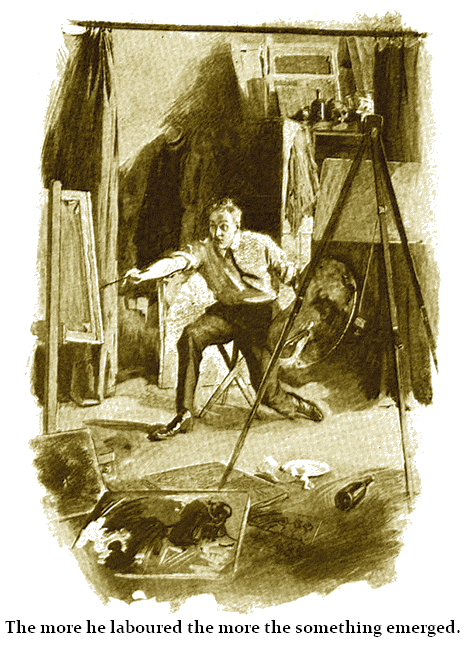
Ulbster retired to Bloomsbury baffled. In the morning he visited the
exhibition again. At that hour the rooms were almost empty of visitors, and
he gave himself over to the unalloyed contemplation of Post-prandial
Symbolism. He crept round the walls like a fish round the sides of a strange
aquarium, drinking the spirit of Post-prandial Symbolism in quick gulps as he
went. It had a strange effect on him. His eyes grew wilder at every canvas,
and more and more like those of some goggling sea creature bothered by the
glass of his prison. His fingers strayed among his hair, pulled it and
rumpled it in the agony of his desperation; so that when at last he dashed
forth, soaked with as much of the spirit of Post-prandial Symbolism as a
human mind could imbibe in a morning, the man at the door hastily retreated
behind the turnstile-counter, and an old lady who had just succeeded in
crossing from the opposite side of the road turned and ran back again
regardless of taxicabs.
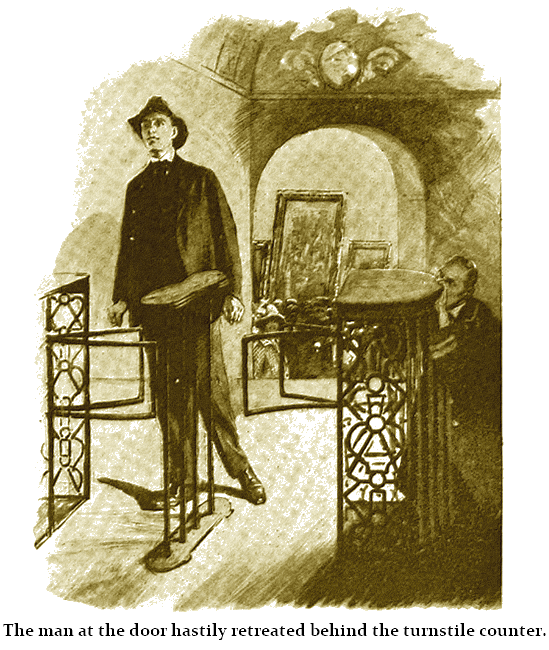
Ulbster scurried through the streets, seeing all things in blue and yellow stripes with pink spots among them, till he reached his studio and hurled himself at the canvas he had prepared the afternoon before. Possessed with the demon of Post-prandial Symbolism, he fenced and stabbed at it with his biggest brushes till it was starred and striped and splashed and streaked with marks of the assault. Then he looked round him for some other canvas to batter. He had a curious sense of the Presence of the spirit of Post-prandial Symbolism, as of something living, something actually in the room, guiding and overseeing him; so much so that he felt a sort of dread of looking up from his work. Now, however, he did so, reaching for another canvas; and as he did it he was aware of a positive shadow overhanging him, so that involuntarily he glanced upward. Something--some intangible shadow, some shapeless phantom--vanished from the open skylight above even as he glanced; and with that the spell was broken.
The sky shone clear and blue through the skylight, for it was a fine day. He turned to the grievously-assaulted canvas and viewed it uneasily. Surely it needed a careful touch here--and there, too. He replaced it on the easel and gave it the touches it seemed to require; then others, and then still more, for one touch always called imperatively for another. And in five minutes it dawned on him that he had ruined the picture, for it had become hopelessly intelligible:
He tried again, but with no success. He snatched a belated lunch of biscuits and bottled beer, and smeared more canvases till he remembered that he was spoiling pictures already painted; further, he reflected that once the dealer had been brought to the studio there might he a possibility of selling some of his old pictures "at a price," if only he refrained from obliterating them with these Post-prandial scrambles. He finished the day by mounting a brand-new canvas on the easel and staring at it for half an hour, smoking moodily. He remembered that some of the most Post-prandial of all the Symbolists got their effects with streaks that left much of the white canvas exposed. But the fit was gone, and nothing more was to be said or done that day. He resolved to take another debauch of Symbolism in its native lair, and then dash back to this plain canvas. His palette he left as it was, unscraped, for that would leave the paint thicker and stiffer for the morning.
A night of starry and stripy nightmare ended in oversleeping, and it was ten ere he reached the studio. He turned the key and pushed the door open. Inside, a screen stood about the door and hid the most of the room; but even as he passed the screen he was aware once more of that strange passing shadow, that formless phantom that vanished ere he could fix it with his vision. He gazed upward, but the skylight was clear of all brooding shadow, standing a little open as he had left it.
But what brought him up standing and staring in the middle of the floor was the canvas on the easel. For where he had Left it blank and white was a complete Postprandial Symbolist picture, with all the sublime incoherence, the staring streakiness, the divine irresponsibility of the great Arsène Croutier himself. Stanley Ulbster stood and gasped. Here was Post-prandial Symbolism in essence--the very thing.
How had it come there? Stanley Ulbster found himself bemusedly gazing at his palette and brushes. He could not be sure of where and how he had left them, but clearly they had been used, and it interested him to perceive that the stale paint had gained the ropy coarseness that he had hoped for; in touch and quality of paint here was Postprandial Symbolism par excellence.
But whence? He bethought him of his starry and stripy nightmares, and accused himself of somnambulism. That was difficult to believe, nevertheless. There was the street door of the house in Bloomsbury to be negotiated twice, with its bolts, bars, and the key in the landlady's pocket. It seemed unlikely; and yet here was the picture--the thing he had been struggling to accomplish for the better part of two days.
He walked round the studio, thoroughly puzzled. He could not tell if things had been moved, for his habits were careless, and it was not easy to remember where he had left anything. The key of the room was in his own pocket, at any rate; nobody else could get into the place. He decided that he must have been sleep-walking. It must have been an extraordinary performance.
Still he wondered, and in the midst of his wondering he was surprised by Flack, who found the door open, tapped, and came in. The dealer coughed slightly, and had begun his "Good morning" when his eye fell on the picture on the easel. He paused, and ejaculated, "By Jove! you've got it there, Mr. Ulbster! Certainly you've got it there!"
Stanley Ulbster struggled desperately with his bewilderment, and made a shift to cock his eye jauntily at the picture and say, "Yes, I think it's come pretty well!"
"I'll take that one," the dealer remarked, "at a price."
The familiar phrase roused Ulbster's business instincts. "Well," he said, "it rather depends on the price, you know. I haven't shown it to anybody else yet. Things are not quite what they were when we did business last time, remember."
"Very well--you needn't show it to anybody else. Shall we say fifty?"
Stanley Ulbster said fifty, with some difficulty in suppressing a shout. He said it deprecatingly, as though he felt himself rather hardly treated.
"Of course," represented Flack, "there'll be more. Haven't you done some more?"
But he shook his head at the others.
"No," he said, "you must do some more like this. You ought to knock off a lot of these in a week. I'll write a cheque for this one and come again."
Stanley Ulbster was far too elated with his new wealth to be able to work more that day, no matter how he might try to force himself. He set up another canvas and made a few other preparations, and that was as near work as he got. He went out to cash his cheque. He melted a little of the fifty pounds in a noble dinner, and he went to a theatre; and at night he lay awake wondering by what strange agency that picture had been evolved. It was dawn ere he fell asleep, and it was ten when he sought breakfast. Then he made for his studio in an odd frame of mind; for he was conscious of a certain internal excitement--a strange, agitating expectancy. It increased as he mounted the stairs, and as he opened his studio door it grew even painful. And, indeed, it was justified; for there, on the canvas he had left on the easel, was another Post-prandial Symbol!
If anything, it was better than the first. It could not have been more unintelligible, but now there was a certain serene deliberation about its promiscuousness; for the wild dash of improvisation was substituted an easy inconsequence, a more leisurely fortuitousness that bespoke a matured Postprandialism, a Symbolism of more assurance.
Stanley Ulbster sat on a chair and gazed at the picture with something approaching superstitious fear. It was quite impossible to persuade himself that he had done it himself in a fit of sleepwalking; there was too much against such an explanation. But, whatever explanation might be the right one, he found it more comfortable to contemplate it with the door well open behind him.
He recalled all he had heard of the legends of brownies, kobolds, and Robin Goodfellows--those useful, benevolent gnomes of the under-world who in every country have been accredited with working in the night for favoured mortals. It was odd, it struck him for the first time, that the folk-lore of so many widely-sundered nations agreed so curiously as to the existence and activity of such spirits; almost certainly there must have been some foundation for so generally received a belief. Could it have any connection with that strange phenomenon, the frenzy, the inspiration of the artist? It was a mystery which had puzzled many, that amazing seizure, or possession, of a man and all his faculties, when he found himself inspired to create a work of art. Could it be that, when one spoke of the "spirit" of this, that, or the other method of art, one spoke with more meaning than was intended, and that the spirit was an actual separate existence, which did its work sometimes through the hands of the artist and sometimes independently, without their intervention? He well remembered his experience of two days earlier, how he had been possessed of the spirit of the new style of painting for a while, and how, like an actual presence, it appeared to leave him bodily. He thought of that strange shadow on the skylight; and when from these reflections he turned to gaze on the new performance drying before his eyes, he felt an inclination, difficult to resist, to get out of that studio, so strangely haunted, and clear his brain with a walk in the street.
He shut the door and descended the stairs, with an odd sense of disembarrassing himself of an invisible companionship. He walked into the street, stared at the shops, felt the reality of the things about him, and called himself a fool.
He dropped in at Flack's, leaving a message that a new picture was ready, and then walked slowly back to the studio, to meet a new astonishment. For the picture had been carried farther in his absence! There was no possible mistaking the fact. Several wildly irresponsible streaks and wriggles of paint crossed and intermingled with those he had already seen; and he could not disguise from himself that here again, from the Postprandial standpoint, was an improvement. There was now a richness and completeness of confusion wholly beyond what had existed before--something that even Arsène Croutier himself had scarcely achieved in his most admired efforts.
Ulbster walked about the room and stared into every corner. He pulled aside the curtain that obscured the side window, threw up the sash, and gazed out over the roofs and chimney-pots. No possible explanation presented itself, though now he confronted the enigma with far more equanimity than before. So much so that it struck him to profit by an ingenious device. He propped up the picture before a large mirror, took a new canvas, and carefully copied the reversed reflection, taking care to exchange the colour of each streak for that of another--blue for yellow, red for purple, and so forth. This occupied some three-quarters of an hour, for he was careful to imitate every stroke with extreme accuracy; but in the end he was possessed of two Post-prandial Symbols apparently wholly unlike.
Flack's delight was boundless. "This," he said, when he arrived in the afternoon, "is really something like. Go on like this, and I'll make it a one-man show, and knock all the Frenchmen to fits. But why only two? Surely you can turn out three or four of this sort of thing a day if you like--a dozen if you have your lunch in the studio? The others did!"
"The others?" queried Ulbster.
"Why, yes. I didn't mean to have mentioned it, but I put one or two on to this idea before I saw you. I didn't buy their pictures--they weren't a bit of good, or I shouldn't have come to you. They were like most of those you showed me yesterday--things in 'em that anybody could guess at once. I'll take these, of course, at the same price."
But Stanley Ulbster had been thinking about that matter, and shook his head pensively. "Well, no," he said, "not exactly the same. I think I could get a trifle more for these--especially as they're a bit larger. Certainly a hundred apiece."
"No, no; that's absurd," replied Flack, with some alarm. "You'd get nothing like that."
"Well, perhaps not," the painter admitted, judicially. "But I could try."
"No, no; play the game now. You must admit it was I who put you on to this. Come, I'll meet you handsomely. I'll give you a hundred and fifty for these two on condition that you let me have the next half-dozen I select, of this size or larger, at the same price. Surely that's good enough?"
"Well," the artist replied, with some show of thoughtful reluctance, "perhaps it is. It'll save trouble, I suppose. All right."
Stanley Ulbster was a successful painter already. He sat down and made a little calculation that by the aid of his mirror, an almost infinite variation of colours, and the use of canvases of different shapes and sizes--upright, oblong, sideways, upside down--he could evolve some hundreds more Postprandial masterpieces from the three already in existence. He took a walk round the Post-prandial Symbolist show before closing time, and triumphed to perceive that he--or his "ghost" for him--was the equal of the great Croutier at his best, and by far the superior of Fumiste de Boulemiche and his colleague de Boue. He had a dinner that night that made the recollection of yesterday's seem poor; but it did nothing to improve his night's sleep. He was excited and restless, and slept in snatches; and in the early morning he arose with a definite purpose in his mind.
His natural curiosity could be stifled no longer. Prudence bade him leave well alone, but, as everybody knows, only let the fight last and curiosity must beat prudence at some time. He oiled the key of his studio, and regretted that he had not thought to oil the lock also, before he had left. There was always a creak, but perhaps oil on the key would overcome that; at any rate, he was resolved to enter the studio early and quietly. He started at seven o'clock, vastly to the amazement of the little servant-maid who was already busy on the front steps of the Bloomsbury lodging. He found himself in some trepidation as he mounted the stairs, and near the door he absolutely stopped in doubt. What he was doing might spoil the run of luck; but, after all, he could surely acquire the trick himself in time, and meantime there was the looking-glass dodge. He must penetrate the mystery before him. He insinuated his oiled key and began to turn it very slowly.
The oil was useless. There was a check in the turn and then the lock
squeaked as loud as ever. With that he snapped it back and dashed in at the
door. There was a crash, a bounce, and a strange, inhuman squeal; the screen
went over, some dark brown thing dashed up the easel and through the
skylight, and the easel rocked and fell; and there, grinning and jabbering
through the opening of the skylight, was a large and angry monkey. He had
barely seen it when his palette came hurtling at his head, struck the wall,
and, falling face down on the floor, deposited there yet one more
Post-prandial Symbol. Then the skylight shut with a slam and the spirit of
Post-prandial Symbolism vanished from above it.
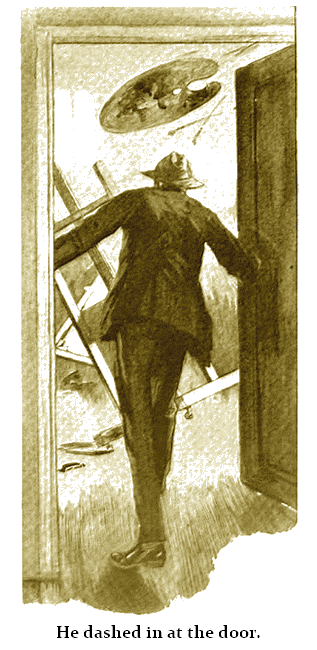
For one dumbfoundered moment Stanley Ulbster stood and stared about him. Then he realized that a fortune was escaping him over the tiles. He dashed to the window, flung it open, and gazed downward. Hand under hand, with waving tail, his brownie was retreating by way of a water-pipe, gnashing its teeth as it went. Ulbster whistled and snapped his fingers invitingly, as one does to a dog; but the Artist Unknown misunderstood his advances and chattered more savagely than ever. Springing from the water-pipe, the last of the Post-prandial Symbolists alighted on a low roof, whence he continued his retreat toward the bird and beast shops of St. Andrew's Street, turning to face Ulbster from time to time, and reviling his fellow-craftsman with bitter gibberings.
Since blandishments would not draw the fugitive, Ulbster resolved to watch the direction of his retreat, with a view to the purchase of so valuable an auxiliary. Plainly he was making for the largest of the dog and poultry shops, at the corner of a narrow alley leading into the main street; and presently, at a trap-door in the roof of that same shop, a man became visible, peering anxiously, and seeking concealment behind a chimney-stack. The Symbolist drew near the trapdoor, and the man craned his neck eagerly--too eagerly, in fact, for, with a sudden leap aside and a fresh burst of angry chatter, the nameless rival of Arsène Croutier made for an adjoining roof by way of another water-pipe.
Seeing he was discovered, the man abandoned his concealment, and with affectionate greetings offered nuts from his pocket, and a banana. The Symbolist was sorely tempted, and paused in his flight; but an incautious movement on the man's part alarmed him afresh, and off he went on a headlong scamper over the adjoining roofs.
The man disappeared down the trap-door, and Ulbster saw that he must join the chase from the street or lose his colleague altogether. He ran his best, and when he reached St. Andrew's Street he found that the hunt was up, and already many men and boys were scuttling up by-streets, scaling ladders, climbing scaffold-poles, scrambling over roofs, and dodging about chimney-stacks with shouts and chevyings that had already converted the evasion of the fugitive into a desperate and frenzied flight. Over roofs, across brick precipices, down pipes, up poles, along parapets he went, a dazzling and unapproachable example to all Post-prandial Symbolists; and Ulbster, having ascertained that his owner was the man of the corner shop, left the crowd and returned to his studio.
Late in the afternoon he descended into St. Andrew's Street, and made inquiries at the dog-fancier's shop. The shopkeeper shook his head mournfully, and his partner said, solemnly: "Gawn. Fell a victim."
"Pore old Pongo," the shopkeeper explained; "they frightened him fair off 'is 'ead, that silly, 'owlin' crowd. After about an hour and a 'alf's chase, he got into that big brewery over there past the Dials. He dodged 'em this way an' 'e dodged 'em that, an' at last he got into the settlin'-'use, and ran round the edge of the vats till he got bosky in the 'ead with the smell o' the beer an' tumbled in."
"Drowned?" queried Ulbster.
The shopkeeper nodded gloomily.
"No money would ha' bought him this time yesterday," he said. "He was a
genius, was that monkey, and we was trainin' him to do the Consul business.
There was a fortune in Pongo at the 'ails. I can't make out now how he got
out; but he was equal to any door or winder or skylight as you could name,
was Pongo; an' I got a sort of idea he must ha' been out once or twice
lately, 'cos he'd got paint on him from somewhere--blue an' yaller. We'll
never see another like Pongo."
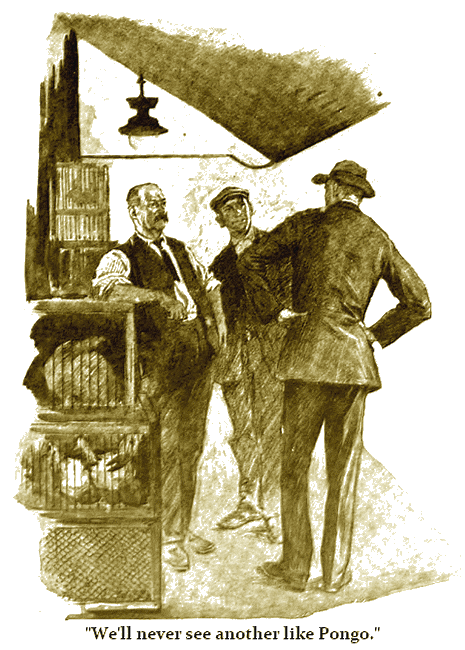
"No," agreed the partner, "that we won't. But lor," he added, with a brighter look upward, "wot a glorious death!"
But Stanley Ulbster's success was great and immediate. His show came quick on the heels of the great one of the works of Arsène Croutier and his disciples, and his puzzles were better than theirs. The popular papers printed photographs, and gave prizes to readers who guessed which was she right way up, and he was famous. So that, if he had only fully understood his public, he would have troubled himself no more, but would have painted what he pleased with perfect applause from everybody who can criticize a picture once he knows the name of the artist. But he would seem to be still a little uneasy, for he is quite recently reported to have been trying to buy a monkey.